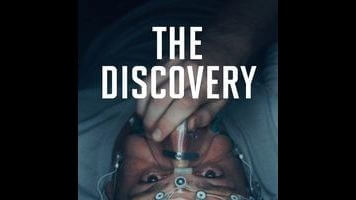There’s life after death in the twisty, soapy science-fiction indie The Discovery

The Discovery, Charlie McDowell’s Sundance-approved Twilight Zone weepie, fits neatly into a subgenre one might call The Brit Marling Movie. No, it doesn’t actually feature the statuesque star of Another Earth, Sound Of My Voice, and I Origins. But like those indie sci-fi brainteasers, which hit some strange middle ground between mumblecore and Ray Bradbury, it wraps a fantastical conceit around a human-scaled drama, attempting to simultaneously blow minds and connect with hearts. The Discovery comes a little closer than any real Marling vehicle to pulling off that genre tightrope act. At the very least, its central mystery keeps you guessing, right up until a final turn that’s nearly as clever as it is convoluted.
What if there was irrefutable evidence of an afterlife? What if science could prove, beyond a shadow of a doubt, that our consciousness goes somewhere after our body dies? That’s the discovery of The Discovery, which imagines one plausible consequence to this monumental breaking news. The film’s first scene lays out the outlandish premise, as a journalist grills Thomas Harbor (Robert Redford), the scientist who solved life’s greatest mystery, in a rare televised interview, some two years after the results of his research go public. Turns out that Harbor’s bombshell has caused a massive uptick in suicides, what with fear of oblivion no longer outpacing desire for escape. The interview ends, in fact, with the cameraman thanking him personally for the liberation, before blowing his own brains out.
Having laid an intriguing foundation with the literal and figurative bang of its cold open, The Discovery adjusts its information flow to a slow drip; going forward, the film carefully hoards its secrets, meting out big reveals in piecemeal. Four years after that fateful interview, Will (Jason Segel) and Isla (Rooney Mara) meet cute on a ferry, both en route to an island for reasons they’d rather not disclose to each other. Will, as it happens, is Harbor’s resentful eldest son, and has come to see his estranged, disgraced father, who’s continued his work in secret at this remote outpost, alongside the younger Harbor boy, Toby (Jesse Plemons). Isla, by contrast, hides a big trauma beneath her spiky exterior; she’s traveled all this way to do what millions of others have in the wake of Harbor’s discovery and take her own life. And yet the two get caught up in each other, and also pulled in by a new mystery. Suddenly, it’s not just whether there’s a great beyond but what that great beyond might look like.
McDowell’s last feature, The One I Love, was a whip-smart debut: a metaphorical romantic comedy about a couple that begins fooling around with idealized doppelgängers of each other. His new one is bolder, at least conceptually and stylistically. Redford’s obsessed scientist has turned his island research facility into a kind of New Age cult, and that detail—combined with brilliantly blue ocean imagery, a sometimes atonal score, and a questionnaire scene that plays like a milder form of “processing”—makes The Discovery the first American indie to owe a clear, considerable debt to The Master. There’s also a fair share of Christopher Nolan in its knotty plot architecture, which spirals into a melodramatic series of reveals, tearing back layer after layer. At the same time, McDowell hasn’t abandoned his own voice; his ambitions have ballooned, but not at the expense of the balancing act he creates between high concept and grounded relationship study.
Not that the relationship side of that equation entirely computes. Surrounded by a strong supporting cast (Plemons is especially good as the jam-band-loving underachiever son), the leads have a likable, antagonistic rapport for a while, playing off each other’s moodiness. But The Discovery’s climax hinges on a romantic chemistry that doesn’t quite spark. Maybe that’s because Mara, rocking a blond wig and a blank stare, defaults to the chilly aloofness that can be her crutch. Or maybe it’s because Segel, so effectively cast against type as David Foster Wallace in The End Of The Tour, just seems miscast here. Either way, it probably would have taken more richly drawn characters for the film’s soapy finale to reach the emotional crescendo it seeks. That said, fans of twist-on-top-of-twist science fiction will get joyously dizzy tracing the movie’s loops and curves. The Discovery may not entirely satisfy as a love story or an anguished family drama, but it bends minds agreeably.